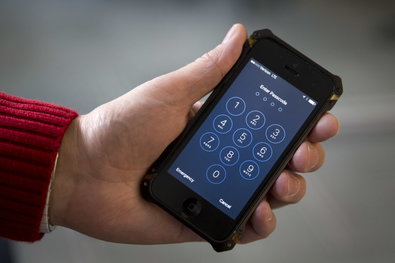
Crimes, iPhones and Encryption
Apple is refusing to comply with a federal court order to help the F.B.I. unlock an iPhone 5c used by Syed Rizwan Farook, who was killed by the police along with his wife, Tashfeen Malik, after they orchestrated a mass shooting in San Bernardino, Calif., in December that left 14 people dead. The move sets up a legal showdown between Apple — which says it does not possess the technology to open the phone and will not create it because it would threaten the privacy of its customers — and the law enforcement authorities, who say that new encryption technologies hamper their ability to prevent and solve crime. Should companies have to unlock encrypted communication in the case of a crime?
* encryption = 암호화(함)/ comply with ~ = ~을 준수하다, 순응하다, 따르다/ federal court = 연방 법원/ along with ~ = ~와 함께, 와 마찬가지로/ orchestrate = (복잡한 계획・행사를 세심히 또는 은밀히) 조직하다; (음악을) 오케스트라용으로 편곡하다/ mass shooting = 총기 난사/ set up ~ = ~을 촉발[유발]시키다/ showdown = 마지막 결전/ threaten = 협박[위협]하다/ the law enforcement authorities = 사법당국(검찰과 경찰등), 법집행 당국/ hamper = 방해하다/ unlock = 열다; (비밀 등을) 드러내다/ in the case of ~ = ~에 관하여는
 범죄에 관해서는 회사들이 암호화된 통신(내역)을 풀어야만 하나요?
범죄에 관해서는 회사들이 암호화된 통신(내역)을 풀어야만 하나요?
1. No Smartphone Lies Beyond the Reach of a Judicial Search Warrant
Decisions about who can access key evidence in criminal investigations should be made by courts and legislatures, not by Apple and Google.
2. An Unprecedented Order That Puts Us All at Risk
This kind of technological power will become ripe for abuse not only by the government, but also by identity thieves, estranged spouses or anyone who would benefit from snooping into your life.
3. An International Precedent for Sharing Encrypted Data
All the U.S. and other countries are asking for is lawful access to communications when authorized by a court — not a backdoor into phones.
4. A Design Defect That Could Leave Us Open to Threats
When law enforcement and intelligence agencies try to mandate defects in the devices that power our daily lives, they are inherently making us all less secure.
5. What Qualifies as Legitimate Access in the iPhone Case
The government should have an ability to compel companies to unlock encrypted devices for access to evidence of crimes, but it should not be able to force companies to build access tools and security vulnerabilities.
Sample Essay
An Unprecedented Order That Puts Us All at Risk
What is at issue is the security of our devices and the ability of all of us to use strong encryption to protect ourselves.
If you protect your smartphone with a passcode, the device is encrypted. But the Justice Department convinced a federal judge to order Apple to create new software that would enable the F.B.I. to crack the encryption on the iPhone of one of the San Bernardino attackers by trying a large number of possible passcodes.
This order is unprecedented.
The White House emphasized that the F.B.I. is only interested in unlocking this single device in this one investigation. In reality, the government is taking advantage of this tragic event to establish a dangerous precedent. The practical problem is that if Apple creates this new unlocking technology, its deployment would be like opening Pandora’s Box. The security of all iPhone users would be at risk.
The F.B.I. is trying to obtain as much evidence as possible. But the government often cannot get all the information it wants to investigate or prosecute cases. It is constrained by constitutional protections like the Fourth Amendment and other rules that recognize important public policy considerations, such as the rules of privilege that forgo valuable testimony in order to protect the confidentiality of statements made to lawyers or doctors.
The key consideration here is that if Apple complies with the judge’s order, device encryption for all iPhones would be compromised. The government is essentially asking Apple to create a master key that can be used not only to unlock this one iPhone, but every iPhone.
This kind of technological power will become ripe for abuse — not only by the government, who will surely seek many more such orders, but also by nefarious individuals should this iPhone unlocking technology fall into the wrong hands — such as identity thieves, estranged spouses or anyone who would benefit from snooping into your life.
Compliance with the judge’s order will also set a dangerous precedent globally. Authoritarian regimes will be further inspired to attack the journalists, human rights advocates and other members of civil society who rely on strong encryption for their work.
The benefits of robust encryption are not abstract. We must push back against governmental efforts that undermine it — because there is no backdoor that can be used only by good guys and not by bad guys.





![]() 범죄에 관해서는 회사들이 암호화된 통신(내역)을 풀어야만 하나요?
범죄에 관해서는 회사들이 암호화된 통신(내역)을 풀어야만 하나요?






